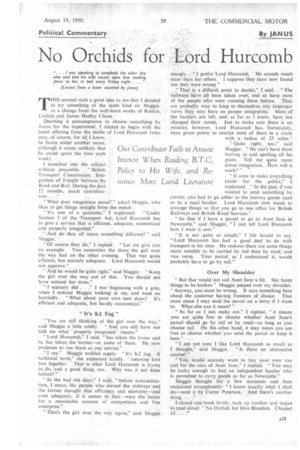No Orchids for Lord Hurcomb
Page 43

If you've noticed an error in this article please click here to report it so we can fix it.
Political Commentary
By J8N US THIS seemed such'a good idea to me that I decided to try something of the same -kind on Maggie, as a change from-the well-worn works of Ruskin, Carlyle and James Hadley Chase.
Deeming it presumptuous to choose something by Janus for the experiment, I elected to begin with the latest offering from the stable of Lord Hurcomb (who
may, of course, for MO know, be Janus under another name, although it seems unlikely that he could spare the time each week) I launched into the subject without preamble. "British Transport Commission: Integration of Freight Services by Road and Rail. During the past 12 months, much consideration .. ."
" What does integration mean?" asked Maggie, who likes to get things straight from the outset, "it's one of a quartette," I explained. "Under Section 3 of the Transport Act, Lord Hurcomb has to give a service that is efficient, adequate, economical and properly integrated." .
" And do they all mean something different?" said Maggie.
"Of course they do," I replied. " Let me give you an example. You remember the dress the girl over the way had on the other evening. That was quite efficient, but scarcely adequate. Lord Hurcomb would not approve."
"And he would be quite right," said Maggie. "Keep the girl over the way out of this. You should not have noticed her dress."
"I scarcely did . . ." I was beginning with a grin, when I noticed Maggie looking at me, and went on hurriedly.. "What about your own new dress? It's efficient and adequate, but hardly economical."
SIIMCS
More L
"It's K2 Tog"
"You are still thinking of the girl over the way," said Maggie a little coldly. " And you still have not told me what 'properly integrated' means."
"Lord Hurcomb," I said, "has taken the trains and he has taken the lorries—or some of them. He now proposes to run them as one service."
"I see." Maggie nodded sagely. "It's K2 tog. A technical term," she explained kindly, " meaning knit two together. That is what Lord Hurcomb is trying to do, and a good thing, too. Why was it not done before?"
"In the bad old days," I said, "before nationalization, I mean, the people who owned the railways and the lorries thought that efficiency and economy—and even adequacy, if it comes to that--were the better For a reasonable amount of competition and free enterprise."
"That's the girl over the way again," said Maggie smugly. "I prefer Lord Hurcomb. He sounds much nicer than the others. I suppose they have now found out they were wrong"
" That is a difficult point to decide," I said. "The railways. have all been taken over, and so have most of the people who were running them before. They are probably wise to keep to themselves any improper views they may have on proper integration. Most of the hauliers are left, and, as far as I know, have not changed their minds. Just to make sure there is no mistake, however, Lord Hurcomb has, fortunatelY, been given power to restrict most of them to a circle with a radius of 25 miles."
"Quite right, too," said Maggie. "He can't have them butting in and spoiling all his plans. Tell me some more about integration. How will it work?"
"It aims to make everything easier for the public," I explained. "In the past, if you wanted to send something by carrier, you had to go either to the railway goods yard or to a road haulier. Lord Hurcomb now wants to arrange things so that you go to one office for British Railways and British Road Services."
"So that if I have a parcel to go to Aunt Jane in Newcastle," said Maggie, " I just tell Lord Hurcomb how I want it sent."
" It is not quite so simple," I felt bound to say. "Lord Hurcomb has had a good deal to do with transport in his time. He reckons there are some things more suitable to be carried by rail than by road, and vice versa. Your parcel; as I understand it, would probably have to go by rail."
urid Literature
Over My Shoulder "But that would not suit Aunt Jane a bit. She hates things to be broken." Maggie peeped over my shoulder. "Anyway, you must be wrong. It says something here about the customer having freedom of choice. That must mean I may send the parcel on a lorry if I want to. What else can it mean?"
"As far .as I can make out," I replied, " it means you are, quite free to choose whether Aunt Jane's parcel should go by rail or by road—so long as you choose rail. On the other hand, it may mean you are free to choose whether you send. the parcel or keep it here."
" I am not sure I like Lord Hurcomb as much as
I thought," said Maggie. "Is there no alternative course?" •
" You would scarcely want to buy your own van just for the sake of Aunt Jane," I replied. "You may be lucky enough to find an independent haulier who is permitted to carry goods as far as Newcastle."
Maggie thought for a few moments and then exclaimed triumphantly: "I know exactly what I shall do—send it by Carter Paterson. And there's another thing. . . ."
I closed one book fir.nly, took up another and began to read aloud: "No Orchids for Miss Blandish. Chapter. 13. . . ."












































































